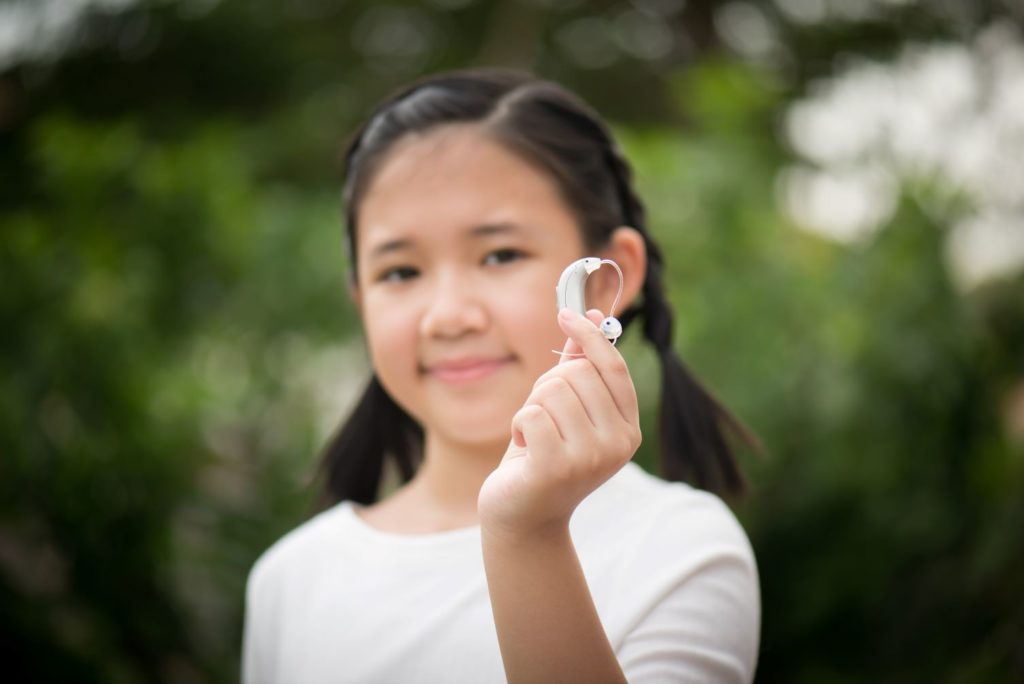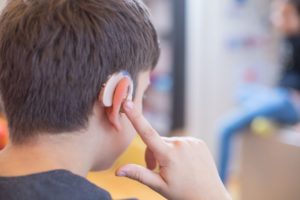As a parent or carer, you know your child best. You know their favourite colour, favourite food and which story they like best before bed. And because you know them so well, you also know when something isn’t right.
Hearing loss can have a profound and sequential impact on your children’s development and education, including their speech and language development, social skills and overall well-being. Understanding the signs that your child needs a hearing assessment is the essential first step in getting them the support they need.
Understanding hearing loss in children
Hearing loss can be present at birth (congenital hearing loss) or acquired later in childhood due to infection or injury. Congenital hearing loss is often detected at a few days old through newborn screening.
Some children may develop hearing issues later which tend to go unnoticed until they begin to show delays in their language development or learning. Regardless of the cause, early diagnosis and intervention are vital. Here are some key signs to look out for:
Early signs of hearing loss in babies and toddlers (0 – 2 Years)
- Lack of startle reflex: It’s normal for newborns to respond to loud, sudden sounds with a reflex called the startle reflex. If newborns aren’t showing this reflex, it could be an early sign of hearing issues.
- Delayed babbling and speaking: By around six months, babies begin making sounds and babbling. If their vocalisations are limited or they’re making no sound, this could indicate a problem with their hearing.
- Failure to react to their name: Come 9 – 12 months, babies begin to recognise and respond to words and their names. However, if your child shows no response this could signal a hearing loss.
Signs of hearing loss in preschool children (Ages 2 – 5)
- Difficulty following directions: Children who have trouble following verbal instructions may not necessarily have behavioural issues; they might be struggling to hear and process what’s being said.
- Limited vocabulary and speech clarity: Hearing loss can hinder speech and language development, resulting in a limited vocabulary or unclear speech. A hearing test can rule out whether or not this limitation is due to a hearing impediment.
- Asking for repetition or saying ‘what?’ often: If your child frequently asks people to repeat themselves or appears confused in conversations, this could mean they are having difficulty hearing clearly.
Signs of hearing loss in school-aged children (Ages 5 and above)
- Struggles in school: Children with hearing loss often face academic challenges, particularly with listening comprehension. Teachers may notice signs like inattention or difficulty understanding lessons.
- Social withdrawal or behavioural changes: When experiencing hearing issues, children can struggle to participate in conversations, causing them to withdraw socially. If you see this change in your child, consider booking a children’s hearing test.
- Ear infections or complaints of ear pain: Frequent ear infections are common in children but can lead to temporary, and sometimes permanent, hearing loss if left untreated. If your child experiences ear pain or complains of ‘blocked’ hearing, it’s worth seeking an evaluation.

Why early hearing tests for children are crucial
An early hearing test for children can make an enormous difference in their development. Hearing is essential for learning language and communication, which are foundational for cognitive and social skills. Children with untreated hearing loss may face setbacks in school and social development, which can have lasting effects. Fortunately, hearing tests are quick and painless.
Here at Hearing Therapy, we perform thorough hearing assessments for children over 5 years of age showing signs of hearing loss, and provide a report for your GP that includes recommendations for onward referral should it be necessary. Our Sharrow Vale clinic in Sheffield is regulated by the Care Quality Commission (CQC), which inspects health and adult social care services in England to ensure they provide safe, high-quality care.
Our children’s hearing services are available to see, assess and treat those ages 18 and under. We provide a range of hearing assessment services depending on the signs your child is presenting. Our children’s hearing tests include:
- Otoscopy – direct examination of the ear canal and tympanic membrane to ensure all structures and landmarks are intact and functioning
- Tympanometry – middle ear pressure tests that help us to check the movement of the eardrum, the air pressure behind the ear drum and the integrity of the eardrum. This can help identify childhood conditions such as glue ear
- Otoacoustic emissions – OAE is a sensitive test of the outer hair cells of the inner ear. It is used in the UK for all neonatal hearing screens and can help confirm the health and function of the inner ear (Cochlea).
- Play audiometry – this is a technique to support younger children in responding to the odd beeps and buzzes of a hearing test accurately and reliably
- Pure tone audiometry – classic diagnostic hearing assessment with headphones placed on the child’s ears and pure tones played to ascertain the threshold of hearing
Treatment options for children with hearing loss
If your child’s hearing assessment confirms there’s a level of hearing loss, there are several treatment options available to help your child hear better. Some of the most common include:
Children’s hearing aids
Hearing aids are the most common treatment for children with hearing loss. Hearing Therapy have some of the most advanced children’s hearing aids that offer discrete, comfortable and adaptive technology for children with a variety of lifestyles. Digital hearing aids, in particular, are effective as they can be programmed to suit each child’s specific hearing needs.
Cochlear implants
Cochlear implants may be recommended for children with profound hearing loss who don’t benefit from hearing aids. These devices are surgically implanted and directly stimulate the auditory nerve, providing a sense of sound. Cochlear implants are generally offered through NHS specialist centres, and we can provide information on the referral process.
Speech and language therapy
Children with hearing loss may benefit from speech and language therapy to help them catch up in language development. Therapists work with children to improve their communication skills and offer guidance for parents to support their child’s progress at home.
Ongoing monitoring and support
Hearing loss in children requires regular monitoring to ensure that treatment is effective and to adjust devices as they grow. Our audiologists in Sharrow Vale, Sheffield are available for ongoing support, making it easy for families to receive assistance as needed.

How to encourage your child to wear their hearing aids
Children can resist wearing their hearing aids, especially if they feel different from their peers. With a lot of patience, positivity and encouragement, you can normalise hearing aids and motivate your child to wear them:
Start by normalising the experience, highlighting how hearing aids are tools that help them connect with the world, just like glasses help people see better. You can make the process fun by letting your child choose colourful hearing aid cases or accessories, turning the device into something they feel proud to wear.
Incorporate hearing aids into their daily routine, making it as natural as brushing their teeth. Praise them when they wear their aids and celebrate small milestones, using rewards if needed to reinforce the habit.
Share stories or introduce role models – such as characters in books or real-life individuals – who also wear hearing aids, helping your child see that they’re not alone. By maintaining a positive and supportive attitude, you can help your child feel confident and comfortable with their hearing aids.
Book your children’s hearing test with Hearing Therapy
Hearing Therapy offers children’s hearing assessments for children under the age of 18, available at our Sharrow Vale clinic in Sheffield. We’re regulated by the CQC which means we’re legally allowed to assess, diagnose and treat children with hearing loss.
If you have any questions, our private audiologists can help you. Simply call our clinic, contact us online or book an appointment using our online booking system.
